#anyway. star wars is so busted for this but dune is not and this is why.
Text
something some people fail to understand about the character names in Dune is that the ridiculously basic names like “paul” and “jessica” and “duncan” serve as slightly jarring reminders that this is all taking place in the far-distant future of our very own society. it’s such a fanciful future not rooted in reality that it can be easy to lose track of that sometimes until you read the name “duncan idaho” or references to the “orange catholic bible” and are reminded that oh yeah, our current earth has a place in the history of this world
#i have a lot of thoughts about this but i have a hard time explaining them well#had a discussion with friends recently on the topic that i avoided getting into this with but i regret that now tbh#i wonder what they would’ve had to say about it#i just didn’t have the energy to try and express myself at the time#and no one else is a freak like me who thinks about dune this often#so the moment has long passed#anyway. star wars is so busted for this but dune is not and this is why.#duneposting
714 notes
·
View notes
Text
Refuting Mr. Plinkett
Part 2: The Prequel Reviews
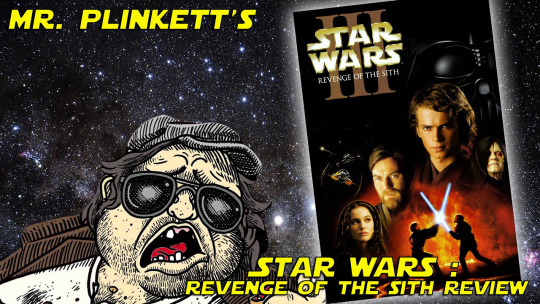
In essence, refuting Mr. Plinkett amounts to nothing more than explaining the plots of films to people who are too dumb to understand them, or too stubborn to ever admit that your explanation makes sense. So, instead of a point for point rebuttal, what I’d like to do is a brief overview that focuses on how grossly Plinkett had to misrepresent the Prequels in order to do his reviews…
(Note: Some major criticisms, that would otherwise have been addressed in the following overview, have been omitted, because they have been, or will be, dealt with elsewhere.)
The Phantom Menace
Plinkett claims he could tell “something was really wrong” because the film opens with a “boring pilot” and a ship that looks like a doughnut … instead of an exciting pilot and a ship that looks like a slice of pie…
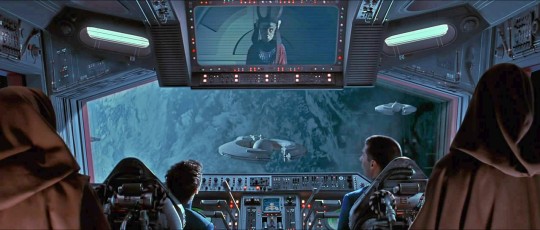
He points it out as a major flaw, and complains at great length, that the movie doesn’t provide all the details of the tax dispute and the blockade, despite the fact that it was merely a smoke screen for the Trade Federation to get into position to invade Naboo, and has virtually nothing to do with the plot. (Boy, when Plinkett first watched the original Star Wars, the lack of information about moisture farming must have driven him nuts!)

When the Neimoidians try to kill the Jedi with “dioxis” gas, Plinkett goes on this incredibly long, rambling thing that makes no sense, and has no discernable point…
“How does Qui-Gon know what kind of gas it is, before he smells it? Isn’t that, like, a contradiction?”
Like, no, it’s not. Some toxic gases are identifiable by both their color and distinctive odor (e.g. chlorine, fluorine, nitrogen dioxide). And Qui-Gon could have smelled the gas, without it doing him serious harm – it depends on the concentration and toxicity…
In the end, it seems that Plinkett just doesn’t believe that the Jedi could’ve known the droids were going to open the doors “in a very short time” – even though Jedi “can see things before they happen”.
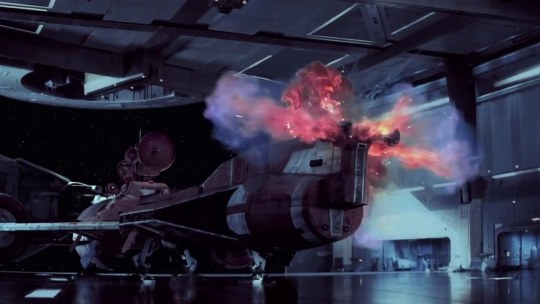
He thinks the Neimoidians should have destroyed the Republic cruiser while it was in outer space (so the resulting debris would’ve been scattered in all directions, I guess…), instead of destroying it inside their own docking bay, because … it will allow them to dispose of all the evidence of their crime. (…uh … yeah … what fools…) And Plinkett apparently believes that the Neimoidians build their docking bays out of flammable and combustible materials. He doesn’t explain why.
Strangely, he thinks it would be in the bad guys’ interest to get word to the senate as soon as possible that they plan to invade Naboo, and maximize the chance that they’ll get busted before the Queen signs the treaty to make the invasion legal – in effect, foiling their own plan. I don’t follow his “logic”.
Plinkett claims that there’s no reason to Qui-Gon’s plan that he and Obi-Wan should stow aboard separate ships (as opposed to stowing aboard the same ship). Because, if they do, one of them could end up landing “hundreds if not thousands of miles” closer than the other to their intended destination … increasing the likelihood that at least one of them will be able to reach the Queen in time… And that’s bad … because … well … he doesn’t say.
Plinkett thinks it’s too late for the Jedi to try to warn the Naboo about the army, if they’re going down with the army… (If two guys with guns were coming to kill you, would you prefer an advance warning of one minute, or none at all? Just ask Hank Schrader.)

He doesn’t understand how Qui-Gon intended to get ahead of the invasion army, to warn the Naboo, without a transport. And he doesn’t understand why Qui-Gon would follow Jar Jar to a city, where he could acquire a transport. Plinkett apparently believes the two things are unrelated.
Plinkett has “analyzed” less than 15 minutes worth of plot, when he makes this absurd statement:
“The Star Wars saga is now damaged totally beyond repair. The lapses in common sense and logic begin to compound on the movie, and now it is broken. I could end this review here … but, I’m really just getting started…”
He says it like he’s ruefully declaring some kind of far-too-easily-won victory. The guy’s so deluded, he thinks all he has to do is scornfully offer a few of his inane half-baked “logical” criticisms, and we’ll all be convinced that he’s running intellectual circles around the movie, and all of us. How embarrassing.
The Neimoidians invade Naboo, place all the people in prison camps, and starve them. Yet, Plinkett somehow remains convinced that their plight is a consequence of the trade embargo. He brings it up repeatedly throughout his review:
“Did they not have the capacity to survive on such a lush planet, with a huge power reactor, for one day without space trade?”
What exactly does the lushness of their planet, or the size of their “reactor”, have to do with being denied food in a prison camp…?
“So, the Queen waits around for some kind of approval for something, to stop her people from dying. Why are they dying?”
They’re not. The Neimoidians used Sio Bibble to send a transmission to the Queen, in order to track her down, and they made him say that the people were dying, that “the death toll is catastrophic”.
In a following scene, Gunray says to Bibble...
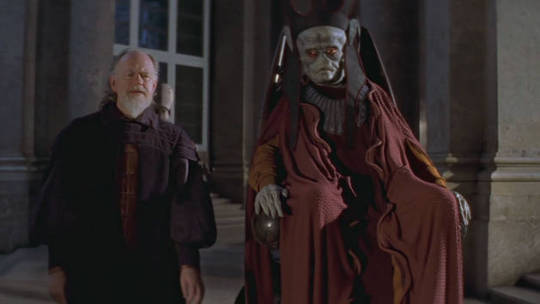
Nute Gunray: Your queen is lost, your people are starving, and you, Governor, are going to die much sooner than your people, I’m afraid.
It’s amazing what you can learn, when you pay attention…
“So, you’re expecting me to believe that the people [who] built this technological wonder were dying without space supplies for two days?”
…groan…
Evidently, continually displaying that he has zero understanding of the children’s film he’s reviewing, which he had ten years to reflect on, was impressive to a lot of morons.
Plinkett’s ability to consistently miss the point is amazing, but what’s truly astounding is his talent for missing his own point: Essentially, he says that the Neimoidians were morons for not forcing Amidala to sign the treaty right away… And then, he says that they’re morons because Amidala might have signed the treaty right away … you know, because if she had, there’d be no need for a vote of no conf-- Well, I covered this stupid shit in Part 1.
The Jedi rescue the Queen, and they run the blockade – Plinkett thinks they shouldn’t have taken the risk, and just stayed on the planet … where it was safe…????????????
Despite the fact that he’s a fan of both Star Wars and Star Trek, Plinkett tries to convince the viewer that he’s baffled about how spaceship shields are supposed to work. (It’s really quite pathetic.)
R2 saves the ship – Plinkett says he didn’t… And don’t you dare believe what you can plainly see for yourself in the movie! Just take Plinkett’s word for it!
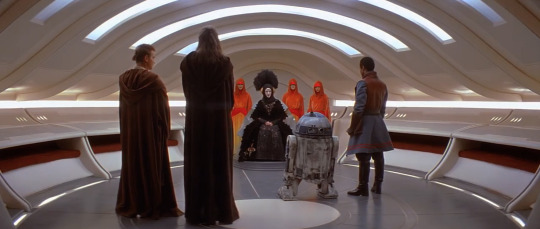
“They inexplicably send R2 up to the Queen to get a pat on the head, I guess. She thanks the little piece of equipment, like it’s a person.”
He claims that this was ridiculous, that the Original Trilogy characters, “even the kind-hearted Luke Skywalker”, didn’t care about droids or their feelings…
The Empire Strikes Back 0:16:50
Luke: Thanks, Threepio. (What?! He thanked a droid?!!)
Return of the Jedi 1:15:47
Luke: Thanks, Threepio. (What?! He thanked a droid … again?!!!)
Here are a few other examples, if you want to check ‘em out; A New Hope 0:28:25, 0:30:09, 0:32:20, 0:45:45, 1:24:50, 1:27:05, 1:43:45, 1:58:07. The Empire Strikes Back 0:42:15, 0:43:40, 1:26:45. Return of the Jedi 0:36:30, 1:43:00, 2:07:26.
Plinkett is absolutely baffled by the idea that the Queen’s decoy would be acting as the Queen’s decoy (Yeah!!! What’s that about?!), and that the Queen would want to keep her identity a secret (even from the Jedi – both as a need-to-know-basis type security measure, and so she’ll have more freedom of movement) for her own protection, while her enemies are trying to track her down and capture her … you know, in case someone comes after her … like Darth Maul, for example. But, naaahh – that would never happen. It’s just plain baffling.
“You’d think the real Queen would want to hang out in the throne room area, to stay current on any updates about what’s going on.”

Hey, yeah – I mean, with five handmaidens, how could she possibly receive updates, unless she’s in the throne room? And, of course, it’s critically important for her to receive these updates immediately … while she’s stranded on a desert planet, and can’t do shit about any of it anyway.
He hates Qui-Gon Jinn for various reasons that make no sense…
Plinkett pointlessly offers a number of alternative solutions to the heroes’ problem of being stranded on Tatooine. This is my favorite:
“Trade the Naboo cruiser for a less fancy, but functional ship”.
In the highly unlikely scenario that it were not seen as a potential threat to the Queen’s security to even attempt to trade the ship, and proceeding from the extremely dubious assumption that there were no other sensitive issues related to allowing it to pass into the hands of whomever, the ship still didn’t have a working hyperdrive generator – a part that was so expensive that Qui-Gon “might as well buy a new ship”. Do you think “fancy” had that much trade-in value on Tatooine…? Like people would line up to trade their means of getting off of the desert wasteland planet for a giant sand-dune-ornament. Right…
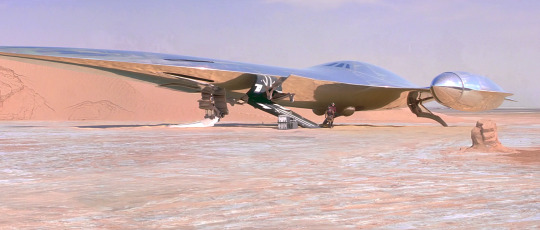

In reference to Anakin having built C-3PO:
“If you’re a little boy with a knack for building things … why would you build the exact same droid that seems to have been mass produced by a manufacturing plant somewhere? Wouldn’t you build some kind of unique robot from your own imagination?”
Plinkett apparently believes that eight-year-old Anakin was an engineer who designed C-3PO and fabricated him from the ground up, rather than acquired 3PO piece by piece, and simply assembled him, the way a kid would build a model airplane … ‘cause, you know … logic…
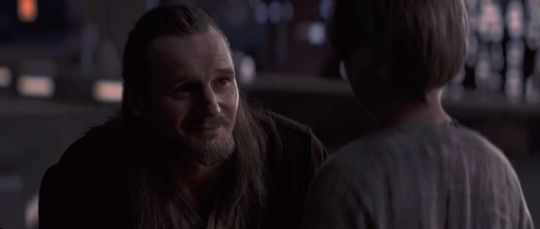
“Then George Lucas completely and utterly finally ruins Star Wars forever, by having Qui-Gon explain that the Force is microscopic organisms.”
Which, of course, is not even close to what Qui-Gon said. Midi-chlorians are not the Force. You know how they have blasters instead of guns, lightsabers instead of swords, speeders instead of cars, Tauntauns and Dewbacks instead of horses and camels…? Midi-chlorians are (sort of) the Star Wars equivalent of DNA – the Force-sensitive gene.
“This entire idea, and why this is in the movie, is so baffling to me that I cannot even wrap my mind around it.”
Oh – is that because you’re so intelligent and insightful?
“It was never even explored, or mentioned, in the following two films.”
Yes, it was. In Revenge of the Sith. You should pay more attention to the movies you review. Maybe, if you did, you wouldn’t be so baffled all the time, and you could wrap your mind…
“Everyone waits until they arrive at Naboo to start discussing how they have no plans at all, and no idea what they’re doing.”
Oh, everyone waits that long do they? Okay, time to test your knowledge of Special Relativity.
Question #1: How long does it take to travel five light-years at lightspeed?
Question #2: How long does it take to travel fifty light-years at lightspeed?
Question #3: How long does it take to travel five hundred light-years at lightspeed?
The answer to all three questions is the same: it takes no time at all – the trip is instantaneous. That is, it’s instantaneous from the traveler point of view. From an observer point of view, the trip takes five, fifty, and five hundred years, respectively. Meaning, traveling at lightspeed is effectively the same thing as time-traveling into the future…
Which leads me to the first of two genre conceits that modify the concept of speed-of-light travel in Star Wars: hyperspace. Traveling through hyperspace allows the characters to avoid the time distortion effect (i.e. they don’t time-travel into the future). The second conceit is that characters do experience the passage of time while traveling at lightspeed, through hyperspace. How much time is unclear. So, how long did they actually wait “to start discussing”...? We don’t know. It might have been five minutes.
As for the second part of Plinkett’s stupid and pointless criticism, that the characters are “discussing how they have no plans at all, and no idea what they’re doing” – that’s simply not what’s happening in the scene (and you don’t have to take my word for it): the Queen has just revealed to the Jedi, and Captain Panaka, that she intends to go to war with the Trade Federation. She has a plan, but she hasn’t yet told them what it is…
When Amidala reveals her plan:
“Why are we all listening to this fourteen-year-old girl…?”
Then, Plinkett demonstrates his prowess as a military strategist (or, is it tactician?) with a brilliant alternative suggestion for the final battle. He says they should focus on “taking out the droid control ship first”, and if that were successful, they could “skip the other two dangerous parts”. (Those other “parts” being; attempting to capture the Viceroy, and drawing the droid army away from the city, with the Gungan army.)
Yeah, sounds good. Let’s do it Plinkett’s way…
First, you’ve got to get the pilots to their fighters. Do you send them into the city alone? Remember, you didn’t do the “dangerous part” of drawing out the droid army, so opposition is much heavier this way. If you send the pilots alone, they almost certainly won’t even make it to their planes. So, you send soldiers to protect the pilots. Say that after the pilots take off, some of your soldiers are still alive: what do they do? Do they stay in the city and get captured or killed, or return and reveal the location of your camp to the enemy...?
Say the location of your camp somehow remains a secret (for the time being): how do the Viceroy and his droid army on surface react, once the space battle has begun…? …while you’re doing nothing, except sitting there, waiting to learn the outcome…?
And, what if the space battle is lost? (And it would have been...) What would your chances be then of succeeding at “the other two dangerous parts”? Do you send in the Gungan army, now? Of course, since the vulture droids have already shot down all your fighters, and killed all your pilots, there’s nothing to stop them from flying to the surface, and blasting the Gungan army into oblivion… What then? Do you think you’d have a very good chance of capturing the Viceroy? And, of course, that was the crucial thing – not the space battle…
No … on second thought, I think I’d rather listen to the fourteen-year-old girl.

“How about a bad guy in the movie whose motivation is clear?”
Palpatine was trying to gain political power. Darth Maul wanted to kill Jedi, for revenge. This was somehow unclear…?
Attack of the Clones
Plinkett criticizes the portrayal of Obi-Wan and Anakin’s relationship:
“So, then we’re given sixty seconds in an elevator to establish that Obi-Wan and Anakin are friends. And, please notice how this is … accomplished … by them recounting things that happened in the past, things we never see.”
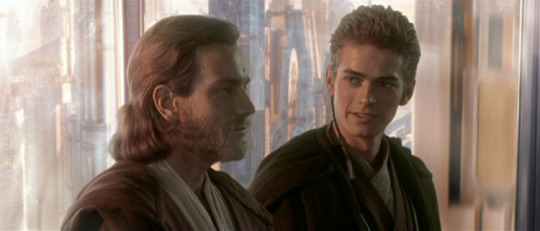
What did Plinkett want? A flashback? They don’t really do those in Star Wars. (This was written prior to the release of The Last Jedi.) Or, should they just not allude to events of the past, ‘cause friends don’t do that in real life…?
Plinkett then compares this “sixty seconds in an elevator” (more like thirty seconds – but, who’s counting) to Luke and Han’s relationship over the course of the three films of the Original Trilogy:
“We see their friendship grow.”
Oh, now I understand … we don’t see Obi-Wan and Anakin’s friendship grow during those thirty seconds in the elevator. Point well made, sir!
Ignoring context and subtext, Plinkett cherry picks the bits that display friction and tension in Obi-Wan and Anakin’s relationship:
“And this is the height of their friendship?!”
No, they reach the height of their friendship in the first half of Sith … but there’s an abiding brotherly love between them throughout Clones, as well.
Plinkett starts in on the sequence that begins with an assassination attempt on Padme, leads to the speeder chase, and ends with Zam Wessel’s death:
“You know, I could spend ten hours talking about just how incredibly dumb this entire sequence is.”
Oh, good…
Plinkett’s criticisms of the sequence all make perfect sense, provided; that you ignore, or forget, or refrain from thinking about Padme’s line, “I don’t need more security”, and Anakin describing the assignment to protect her as “overkill” … that you assume the surveillance cameras in Padme’s bedroom were the only cameras anywhere on Coruscant … that you disregard the distinct possibility that in their attempt to assassinate Padme, Jango and Zam might have had the additional motivation to not get caught … that you accept Plinkett’s assertion that he knows more about droids in Star Wars galaxy than Obi-Wan Kenobi does … that you forget that Obi-Wan is a Jedi, and what his abilities allow him to do … that you refrain from thinking about how Zam Wessel’s shapeshifting ability actually works … that you disregard what character motivations actually make sense in context … and that you ignore pretty much everything that basic common sense would tell you. So, it shouldn’t be too hard for Plinkett fans.
“This movie operates under the logic that assassinations only take place at night.”
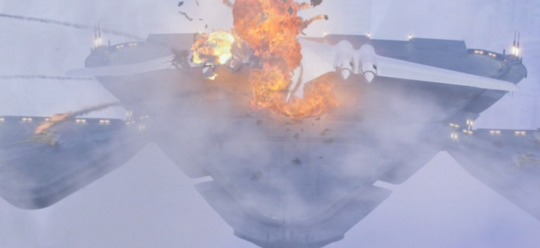
Right. Except for the one other assassination attempt, which took place during the day, and was basically the first thing that happened in the movie.
Loaded question:
“What makes ‘em so sure that the assassin’s gonna try and kill her tonight?”
Nothing. What makes you so sure that they’re so sure? Because if they weren’t, they’d ignore their assignment from the Jedi council, shirk their duties, and go barhopping?

Anakin: She covered the cameras. I don’t think she liked me watching her.
“She turns off any kind of camera surveillance … at the very least, aim the cameras at the windows … You see, surveillance cameras are only really useful for some kind of slow attack, that you could run in and stop. They won’t do any good if someone, like, launched a missile at the building…”
According to Plinkett, Padme didn’t cover the cameras that were in her bedroom – she turned off “any kind of camera surveillance”. He seems to think that her extraneous security, in the persons of Obi-Wan and Anakin, are the only ones responsible for her safety, and that the security cameras in her bedroom must have been the only security measures in place. Makes me wonder what Plinkett thinks the Naboo security officers, and Captain Typho, do to earn their paychecks…
He suggests that Zam could’ve used the assassin droid as bait, and that after the Jedi were gone, just floated her speeder up to the window and shot Padme. Right. Because after Obi-Wan jumped out the window, and Anakin went after him, Typho, his security officers, and Dorme promptly left the room, and Padme just went right back to sleep. Yeah, that’s probably what happened. Makes sense.
When Zam’s shapeshifting ability is revealed, Plinkett describes it as:
“The most advantageous attribute that an assassin could possibly have”.
Could be…
“This also leads me to wonder why someone who could disguise their face, by changing it, would need to wear a disguise.”
Keep that in mind…
In the nightclub:
“The assassin does something out-of-character: he attempts to kill one of the Jedi. This guy’s mission was to kill Padme. If he’s in a position to where he could sneak up on a Jedi, then why isn’t he using this opportunity to escape? Especially when he’s not sure where the other Jedi is. These are, like, amateur mistakes.”
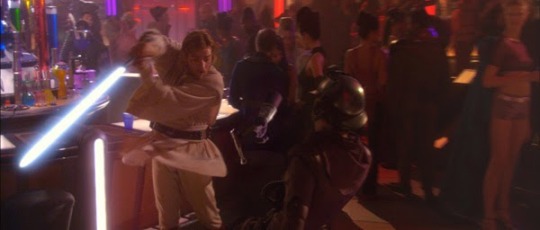
Funny, I didn’t see Zam attempt to kill Obi-Wan. This scene is shot and edited in such a way as to mislead the audience: It looks as though Zam spots Obi-Wan at the bar, then turns and stalks Anakin. But, it’s revealed that she was watching Anakin heading away from her, and then she approached Obi-Wan from behind with her gun drawn. So, what was her motivation? Plinkett thinks she intended to shoot Obi-Wan in the back, in front of dozens of witnesses…
Zam’s chameleonic ability is that she can take someone else’s form by making physical contact with them, and then she assumes their identity. This isn’t explained in the film, but Plinkett’s interpretation makes no sense given what we do know. That is, if Zam were capable of morphing into anyone or anything at any time, why would she not have changed her appearance once she entered the club, so the Jedi wouldn’t recognize her…? And remember, her motivations are to assassinate Padme, and to not get caught…
Do you see what I’m getting at…?
She sticks her gun in Obi-Wan’s back, marches him to someplace with no witnesses, murders him, assumes his identity, goes back to Padme’s apartment with Anakin, waits for the right moment … and kills Padme. Make more sense? Yes, it’s “just my interpretation”, but it’s based on what’s conveyed in the film. Plinkett’s interpretation is based on nothing more than the thoughtless and arrogant assumption that he understands the Prequels better than George Lucas, who devoted a decade of his life to making them…
“The audience is expected to accept too many things we are and are not told … [about] intergalactic space politics, and the Jedi.”
“If the Galactic Republic is made up of a thousand worlds, then why can’t they scrounge up a volunteer army…?”
No one said they couldn’t. They would hardly be voting on whether or not to do a thing that they’re not capable of doing. Hey, Plinkett – maybe now would be a good time to say “common sense”.
“What is this prophecy about? What does it say? Who wrote it? When? What does bringing balance to the Force mean exactly?”
It’s about the chosen one bringing balance to the Force. It says that the chosen one will bring balance to the Force. We don’t know who wrote it. (Why? Do you think you might know the guy?) We don’t know when it was written. (Are you skeptical about a certain period of ancient Jedi prophecy?) It means destroying the Sith.
“So, when they find out that you got a high midi-chlorian count in your bloodstream, I guess your parents give you to the Jedi as a baby to be trained in this creepy cult-like environment and you lose all your free will … See, none of those kids made a personal commitment to follow this rigid lifestyle. You can’t make those kind of decisions when you’re two.”
Those poor kids. Being taught how to use the Force, and build a lightsaber, by wise, compassionate Jedi must have been just awful for them. They didn’t get to choose their lifestyle at two-years-old, like the rest of us did. And once the Jedi Order has you, they won’t allow you to leave. Unless you’re Count Dooku. Or, Ahsoka Tano. Or, any other Jedi who wants to leave the Order. What a nightmare!
Plinkett says that romance is forbidden to Padme:
“For no reason, she’s not allowed to love, either.”
I don’t have any idea what he’s talking about, and neither does he.
He claims that Anakin and Padme have no reason to love each other, except they’re good looking. I would argue that their love is based on the bond they formed years earlier, when Anakin was just a child, but … who’d buy that in a movie romance?

Tristan and Isabel Two (Legends of the Fall)
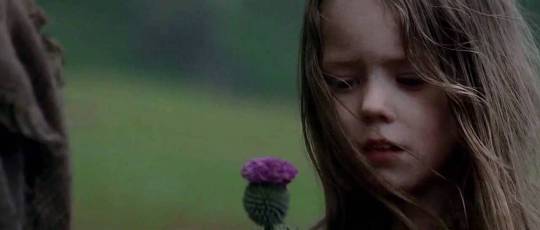
William Wallace and Murron (Braveheart)
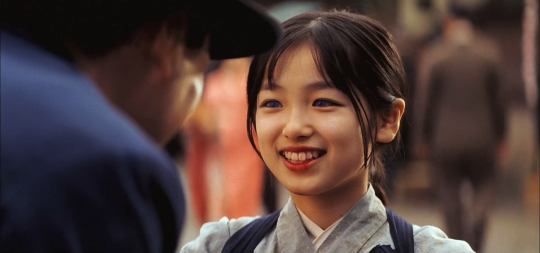
Sayuri and The Chairman (Memoirs of a Geisha)
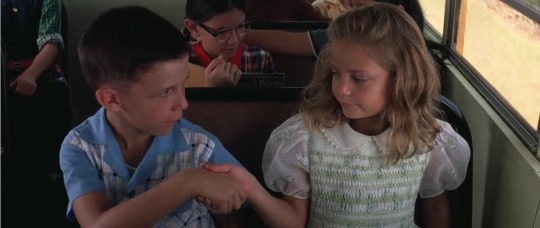
Forrest and Jenny (Forrest Gump)
Plinkett claims it’s obvious that “Palpatine’s behind it all!” This is something he brings up again in his Revenge of the Sith review – that everyone’s stupid for not realizing that Palpatine is secretly a Sith Lord who’s manipulating galactic events…
“So, Obi-Wan finds the planet where the dart came from, and it belongs to a bounty hunter named Boba Fett who’s hanging out there.”
(He meant to say, “Jango Fett”. And he meant that the dart belongs to Jango.)
“He’s the guy who’s trying to kill Pad-a-me. Pad-a-me is the chief senator opposed to the military creation act. Drawing any connections yet?”
Do you mean any connections to Palpatine? No. Because there is no connection to Palpatine. Ostensibly, Palpatine is not in favor of the military creation act.
“Then Obi-Wan sees all the clones, and discovers that the order to make them was placed under suspicious circumstances. This was like ten years ago, and the exact same time that Palpatine was elected Chancellor. Palpatine’s behind it all!”
So, the order was placed at the same time Palpatine was elected… I would say that this is just circumstantial evidence … but, it’s not. It’s just circumstantial. It’s not evidence of any kind…
If you found out that some Australian scientists were making an army of Maori warrior clones, somewhere on the other side of the planet, and that they started the project in November of 2008 … you would assume that Barack Obama was responsible, because he was elected President of the United States at approximately the same time? By that reasoning, Obama could be held personally responsible for anything (and everything) that happened anywhere (and everywhere) in the world on the day of his election. That makes sense to you? Quick, Plinkett – say “logic”!
“So, Obi-Wan sends ‘em a message, and tells ‘em about the clones. But, Mace Idiot still thinks they’re looking for Pad-a-me’s assassin.”
Uh … they are still looking for Padme’s assassin.
“If you think that a Sith is pulling strings in the senate, just order blood tests done on everyone.”
Well, shit. That’s simple. Where were you when they needed you?
“George Lucas ruins the lightsaber, and the Force, all in one scene.”
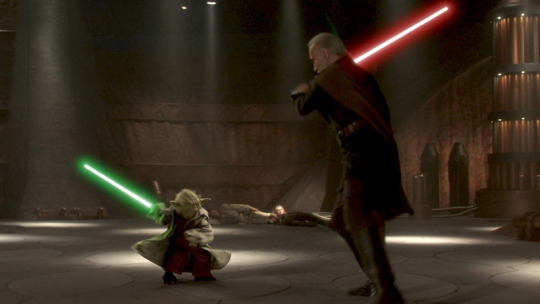
In reference to the lightsaber duel between Yoda and Dooku, Plinkett makes a few points;
1. Lightsabers are overused in the Prequels. 2. The lightsaber is an impractical weapon for certain Jedi, including Yoda. 3. Some verbose, awkwardly expressed, nearly incomprehensible thing about how Yoda fighting with a lightsaber ruins the concept of the Force.
“Like anything that’s cool, if it’s used too much, it becomes boring.”
1. That depends on how it’s used. Every Star Wars saga film (unless you count the Sequel Trilogy) features at least one lightsaber duel that ends in death and/or dismemberment. It keeps the threat alive. It’s not using lightsabers sparingly that makes them exciting. If, in future films, opponents clash swords for a while, then say, “We’ll meet again!” and everyone walks away unscathed – that’s how lightsabers will become boring.
2. They come in all shapes and sizes in Star Wars. Some characters are very tall, some are very short. Suppose Obi-Wan were to be attacked by a twelve foot tall Sith Lord, with a seven foot lightsaber… Should he not use his lightsaber to defend himself … or, should he modify the way he fights...? And a duel is a relatively rare occurrence: a sword is impractical against ranged attacks as well (knife to a gunfight?), but the Jedi compensate with skill, and by the way they use their weapons. The point is that Plinkett’s notion that a lightsaber is impractical only for certain Jedi is moronic - the Jedi don’t use lightsabers because they’re practical, they use them because they’re traditional.
“Yoda has a handicap, based on his physical limitations, when his character should be above that sort of thing.”
3. Believe it or not, to a certain degree, I sympathize with this. Yoda’s duel with Dooku confronts us with a kind of idea that we don’t like to be confronted with… Just as we would prefer not to think that the ones we love are vulnerable to the very same physical phenomena that destroy all “lower” life-forms, we would prefer not to think that the green, pointy-eared, transcendent character who is the living embodiment of centuries of wisdom could also be punted like a football. It’s undignified to the point of seeming an injustice that nature would permit it.
There was a kind of majesty in Yoda’s power and placidity as he was portrayed in the Original Trilogy … and seeing him frantically leap around to defend himself from Dooku’s saber attacks seemingly undermined that. It did, at first, seem somehow beneath him. (But then, when I heard that Yoda was going to duel the Emperor in Episode III, I had a total nerdgasm.)
If Plinkett had simply said, “I didn’t care for Yoda’s duel with Dooku, and I would prefer that they didn’t show Yoda fight with a lightsaber,” and left it at that, I wouldn’t have had any problem with it. (Once upon a time, I might’ve even agreed with him.) But, of course, Plinkett can’t just leave it at that. He has to bring it to the place of George Lucas ruined Star Wars…
Plinkett objects to the idea of Yoda facing an enemy who can nullify his command of the Force, by being equally powerful, and put him in the position of having to defend himself with physical strength and agility:
“If you can match your opponent’s skills with the Force, you then better also be physically strong, too. And this goes against everything that the Force is about … By making Yoda a little guy, they were illustrating that the Force is something beyond the physical. But, by showing Yoda fight with a lightsaber, it ruins all that, because it takes that concept and those rules and throws it in the dumpster.”
Notice how Plinkett expresses his objection as though “Yoda” and “the Force” are interchangeable (i.e. if the Force is “beyond the physical”, Yoda is as well, therefore putting him in physical jeopardy contradicts the concept of the Force and breaks the rules). It’s as if he thinks that Yoda facing an enemy who is equally strong in the Force negates the idea that Yoda is strong in the Force – which it doesn’t. He’s confusing an idea conveyed via the character with the character – it’s the notion that Yoda is not limited by his physicality, in the Force, being extended to the physical itself, and made absolute. The only way Plinkett’s “concept and those rules” could be preserved would be if Yoda were all-powerful. This is not a rational criticism – it’s an ought-is fallacy:
No one should punt Yoda like a football, therefore no one can punt Yoda like a football.
But, Yoda is not the Force. He’s not all-powerful, or “beyond the physical”, or invincible, or invulnerable. He never was. My point is that Plinkett’s criticism is implicitly self-contradictory. That is, if Yoda were not limited by his physicality in the physical, his not being limited by his physicality in the Force wouldn’t mean anything. And it is this very meaning that Plinkett claims to value…
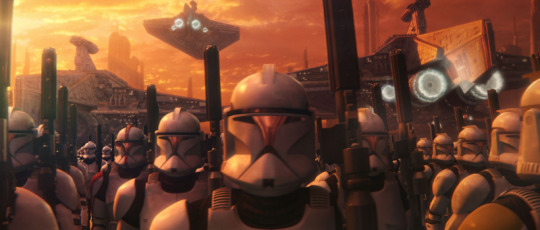
“Nothing much happens at all, except … they get the clones, I guess. It’s a colorful mish-mash of stuff that happens that bridges the gap between Episode I and Episode III.”
…
How insightful!
Revenge of the Sith
“So the very first thing we gotta sit through is a pointless and unexciting sequence where Anakin and Obi-Wan fight off robot things on their ships, only to eventually make it to where they were going to get to anyways.”
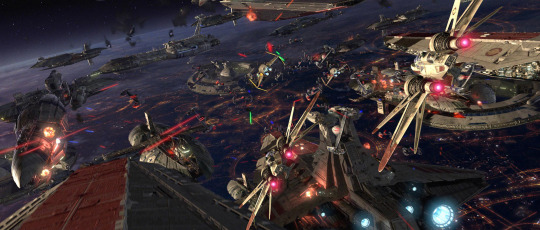
If action sequences are pointless because the characters in them “eventually make it to where they were going to get to anyways,” wouldn’t that make every action sequence, in every movie, pointless…?
Plinkett gives two examples of what he calls “backtracking” (like retconning) in the opening space battle scene; 1. Anakin was a great pilot, and 2. Anakin’s a “good guy” (for wanting to help a clone trooper pilot). But, what Plinkett calls “backtracking” I call establishing, or re-establishing, something that’s extremely common in television series and film franchises, including the Original Trilogy of Star Wars (e.g. nearly everything that happens in the first twenty minutes of The Empire Strikes Back).
He then misrepresents the previous films in his attempt to convince you that he’s making some kind of legitimate point, hoping you’ll forget, or disregard, that; 1. Anakin’s piloting skills were initially established in the Phantom Menace podrace, and 2. Whether they ever regarded the clone troopers as “disposable people”, in the two years of fighting side by side, the Jedi came to think of them as brothers-in-arms – which is further established by Obi-Wan’s interaction with Commander Cody…
In reference to the sequence involving the rescue of Chancellor Palpatine, the defeat of Dooku, and the confrontation with General Grievous, Plinkett asks approximately two dozen rhetorical questions in a row, to demonstrate how confusing it all is, and that it makes no sense. Nearly every question he asks is predicated on whichever counterintuitive presupposition is required as a condition for his (feigned?) confusion. That is, Plinkett only succeeds in demonstrating that he doesn’t understand things that, while not explicit, are, nevertheless, obvious. For example, that Sidious’s fellow conspirators (Dooku, Grievous, et al.) know only as much about his plan as Sidious wants them to know, and that they are being manipulated by him…
And Plinkett clearly seems to think that Palpatine’s plan can only make sense if it’s absolutely guaranteed to be successful. It’s like he’s never heard of a calculated risk…
“What if Dooku just happened to spill the beans about Palpatine being Sidious, when he realized he was betrayed?”
It would have been like asking someone to believe that Winston Churchill was in cahoots with Adolf Hitler. No one would believe it in a million years. Anakin would have seen it as Dooku making a pathetic, desperate attempt to save his own life – which is, essentially, what it would have been.
“What if Anakin didn’t kill Dooku after Palpatine said to kill him?”
Depending on where he was exactly, when the ship went down, Dooku would’ve died, or he would’ve become a prisoner of war … and then died, probably…
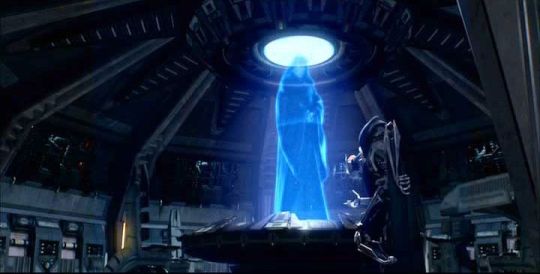
When Grievous bows to the hologram of Sidious, on Utapau, Plinkett says,
“Oh! Grievous doesn’t know…?!”
as if it’s some sort of stunning revelation. Three years before this film was released, in Attack of the Clones, it was established that the Sith Lords, Sidious and Tyranus, had created the Separatist movement, commissioned the clone army, and started the Clone War, which they had been planning for years, while their public personas, Palpatine and Dooku, were the leaders of the opposing sides – that they were manipulating the entire galaxy. So, why the fuck would Grievous know that Sidious was Palpatine…?
“Did Sidious tell [Grievous] to capture Palpatine so that he could lure the Jedis on board only to kill Dooku?”

Grievous: But, the loss of Count Dooku…
“Wait – I guess not.”
As if killing Dooku could not have been Palpatine’s plan, unless Grievous was in on it. Bitch, please.
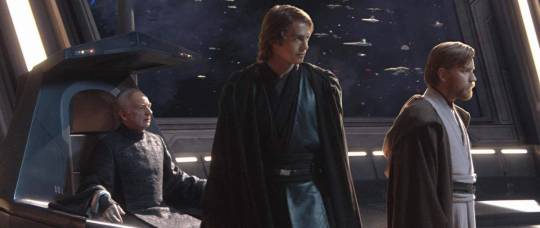
Palpatine: Get help. You’re no match for him. He’s a Sith Lord.
“Obi-Wan then turns, and says something incredibly stupid:”
Obi-Wan: Chancellor Palpatine, Sith Lords are our specialty.
Why exactly was that an “incredibly stupid” thing to say…? Because Obi-Wan was the first Jedi in a thousand years to defeat a Sith Lord…?
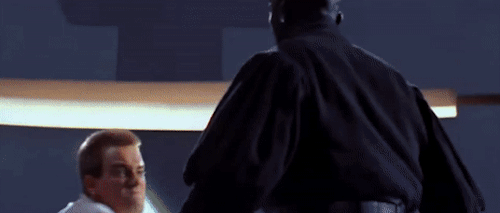
...or, because two minutes after he said it, Anakin became the second?

“His real response should have been, ‘Wait – Get help from where? From who? Who on this ship could help us?’”
Evidently, Plinkett thinks it’s unreasonable of Palpatine, Supreme Chancellor of the Republic, to consider that the two Jedi who came to rescue him might have brought some clone troopers with them…
“Then, after Dooku’s dead, there’s a sudden urgency to get off the ship, when before there was no urgency at all.”
Actually, before Dooku was dead, there was a lightsaber duel happening. And before the duel, Anakin and Obi-Wan sensed “Count Dooku” and “a trap”, respectively. They mentioned that in the hangar … remember? They were anticipating the confrontation. You get it? So, what’s the criticism…? The lightsaber duel had no sense of urgency? And, wait – don’t tell me – it also lacked humanity and emotion, right?
Based on Palpatine’s urging Anakin to leave Obi-Wan behind…

Palpatine: Leave him, or we’ll never make it!
Plinkett believes Anakin should have concluded that Palpatine was a Sith Lord. I guess it’s extremely suspicious that Palpatine wouldn’t want his only protector, on board an enemy ship, in the middle of a giant space battle, to be hampered by carrying an unconscious man on his back…
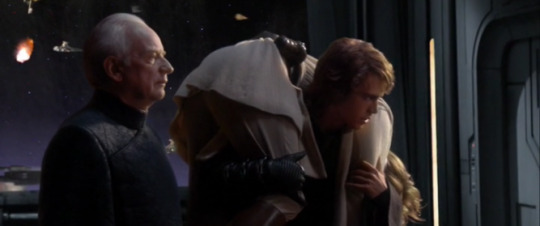
It wouldn’t be perceived by Anakin as Palpatine being panicky, or fearful for his own safety … no, he’s a Sith Lord – it’s the only reasonable explanation. I know that whenever I see someone acting in a cowardly fashion, I always assume they must be an evil mastermind who’s manipulating the entire universe...
“The terrible result of the limited script focus is the lost opportunities of all the other elements at play. Basically, the point of all three films is just to get Anakin into the Darth Vader suit… The ironic part is at the center of all this is the largest galactic war ever…”
So, here Plinkett complains that he doesn’t get to see Clone War adventure that’s not strictly relevant to Anakin’s fall to the dark side… Does he mean something like that space battle, at the beginning, that he said was “pointless and unexciting”? Or, does he mean…
“Obi-Wan goes off on a mission by himself that’s pointless to the ultimate conclusion of the story. This is what they call filler.”
Oh. So, now he doesn’t want to see anything that’s even slightly tangential to “the ultimate conclusion of the story”. ‘Cause it’s “filler”. But, if it hadn’t been in the movie, would he have called it a “lost opportunity”?
“So, again in this film we’re told about those wacky fun adventures that Anakin and Obi-Wan have that we don’t get to see.”
Contradict yourself much? Plinkett’s complaining about not getting to see “those wacky fun adventures” that he calls “filler”, and that he clearly wouldn’t bother to watch if they made a whole TV series about it. Which they did.
Plinkett claims that the fact that Coruscant was visibly unaffected by the Clone Wars makes “the sacrifice and risk of the rebellion utterly pointless”. (Imagine how disappointed he’s going to be when he sees the Sequel Trilogy.) For some reason I can’t fathom, he thinks that of the billions and billions of people, living on tens of thousands of worlds, only those who live on Coruscant matter.

“Instead of waiting three minutes for the clone troopers to arrive, and using his surprise advantage to kill Grievous and end the war, [Obi-Wan] foolishly jumps into the middle of a bunch of bad robots, to apparently challenge Grievous to a duel, or something. All them robots could’ve just started shooting him to death!”
Here’s my interpretation: Obi-Wan knew that Grievous fancied himself a match for a Jedi, and that he would want to defeat Obi-Wan in single combat. That’s how he knew “all them robots” wouldn’t start shooting him to death. (Plus, he’s got that Jedi ability to look into the future…) And by drawing the droids’ attention to the duel, Obi-Wan provided the clone troopers with a surprise advantage against “all them robots”.
My interpretation is based on what we know about Grievous, Obi-Wan, the Jedi and the Force, and how events play out, from watching the film. Here’s what Plinkett’s interpretation is based on:
“Obi-Wan Kenobi is a stupid asshole idiot head.”
Plinkett keeps insisting that killing Grievous will end the war.
“Remember, killing this guy will end the war!”
This is, of course, based on Palpatine’s line to Mace Windu that the senate will vote to continue the war as long as Grievous is alive. Palpatine’s motivation was to get the Jedi to eliminate Grievous for him, but … Plinkett doesn’t really get subtext. And, no, the war will continue if Grievous is alive does not mean the same thing as the war will end if Grievous is dead.
“When Obi-Wan finally kills Grievous, Palpatine then springs his trap to have all the clone troopers kill the Jedis, and then he blames the Jedis for trying to take over. Why didn’t he just do that before?!”
You mean before he had converted Anakin (the fatherless boy Palpatine himself had created with evil magic for the sole purpose of making him his apprentice) to the dark side? Or, do you mean before he had become the beloved leader who had seen the Republic through the darkest times, been voted all his emergency powers, eliminated Dooku, set up the Separatist leaders to be slaughtered, and had the individual Jedi Masters all spread out on different worlds, each surrounded by clone troopers? Gee, I don’t know. I can’t think of a single reason. It doesn’t seem like timing was a factor at all…
“So, what motivation, now that the war is over, would the Jedis have to try and take over?”
Much like Palpatine, the Jedi were about to lose their own emergency powers: the Jedi had become military leaders because of the Clone War.
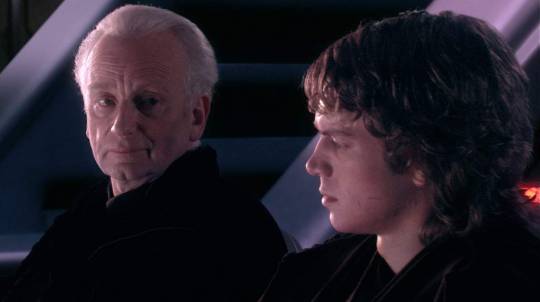
Palpatine: All who gain power are afraid to lose it.
Could it have been any more clearly spelled out?
“And, it’s really apparent by his actions that Palpatine is the one who’s trying to take over. I mean, he is trying to be the Supreme Chancellor forever.”
It’s really apparent to the movie audience. As far as the characters are concerned, Palpatine never sought power – he’s had all his power thrust upon him – from his nomination and election to his emergency powers and extended term of office…
“The opportunities to stop Palpatine’s plan and prevent Anakin from becoming evil were so numerous and obvious that they could be put in a giant list. Let’s do that, shall we;”
“1. Tell Palpatine that his term is up. If he changed the law, argue to make a new law to change it back. Then ask him to state his reasons why it shouldn’t be changed back. Ask him to explain why he in particular is so qualified to conduct a war.”
Okay … so, I guess the Jedi are now lobbyists, or legislators … who are attempting a coup that would, most bizarrely, take the form of an impromptu debate / job interview / competency hearing … thing… Honestly, if you’re not just laughing (or weeping) at the idiocy…
“2. Use the process against him. Have Jimmy Smits call for a vote of no confidence in Palpatine, if Step 1 doesn’t work.”
If Step 1 doesn’t work … ???????????? Call for a vote of no confidence on what basis? Vague suspicion? And Palpatine is going to be voted out by the same senators who applaud when he declares himself Emperor…? Right.
“3. Find out facts about the Clone Army. Look into where the clones came from a little more thoroughly than not at all.”
They did, in the Clone Wars series.
“4. Look into his heart. If you suspect Palpatine is up to no good, try to sense his emotions. If he’s able to block you, he just might know the ways of the Force, specifically the dark side.”
The Jedi sense his emotions, and discover that he’s feeling stressed out… And…? Seriously, what difference would it make how Palpatine was feeling, if you don’t know what those feelings are about. As far as I’m aware, the Jedi can’t read minds.
“5. Midi-chlorian count. Check his midi-chlorian count. Get some blood from his stool.”
Sure, just get some of his blood. ‘Cause that wouldn’t be impossible…
The Jedi suspected that Palpatine was “up to no good”, not that he was a Sith Lord. And even if they had suspected he was a Sith Lord, and they were somehow able to confirm that he had a high midi-chlorian count – it would be useless circumstantial evidence. What would be the point…?
“6. Physically confront Palpatine. Instead of confronting Palpatine inside his private cramped office hallway, wait until he’s in public to arrest him. Eventually, he’ll try to escape, or attack you, and then he’ll be exposed in front of everyone. If he doesn’t, then you can actually arrest him like planned, and elect a new leader in his place.”
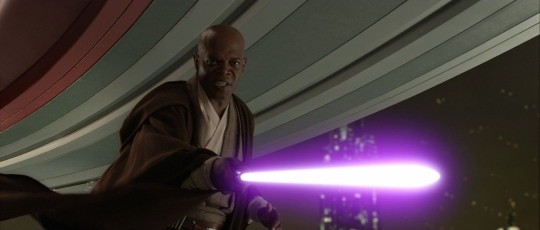
Mace: He has control of the senate, and the courts! He’s too dangerous to be left alive!
Arresting Palpatine in public would very, very likely have backfired. And waiting to arrest him most certainly would have.
“7. Use blatantly obvious evidence to your advantage. Before confronting Palpatine with a lightsaber, again in private with no witnesses, show the damning security tape footage to the senate, which is actually in session at the time you find it. Or, take it to someplace and broadcast it over the news.”
You mean the “damning security tape footage” that, by itself, does nothing but corroborate Palpatine’s story? And I’m sure the local news would be only too eager to run some footage brought to them by public enemy #1.
“8. Team up together and murder him! Instead of splitting up, Obi-Wan and Yoda should have first attacked Palpatine, and then went and killed Anakin.”
Why do you think no one came to Palpatine’s aid when Yoda showed up in his office…?
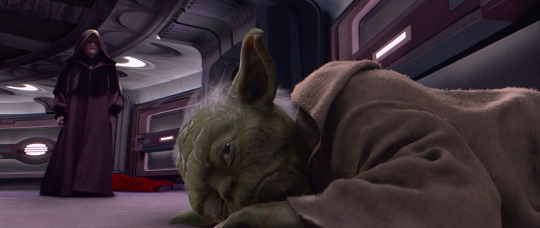
Palpatine: I have waited a long time for this moment, my little green friend.
If both Yoda and Obi-Wan had shown up, and Palpatine had thought there was a chance he would lose, I think it’s very likely the clone troopers from the Jedi temple massacre would’ve popped over for a visit. Also, think about how Yoda exited the senate building…

Wouldn’t have worked for Obi-Wan, would it?
Plinkett offers an alternative to the Jedi Council assigning Anakin to spy on Palpatine:
“Why don’t you spy on him by watching the security holograms that records what’s going on in his office?”

This suggestion accompanies a clip of Obi-Wan watching a security recording from the Jedi temple. (Pssst. Hey, Plinkett – Palpatine’s office is not in the Jedi temple. Sorry…)
Plinkett claims that Anakin is dumb for not knowing that Palpatine is a Sith, simply because Palpatine knows about the Sith. In reference to the scene in which Palpatine tells the story of Darth Plagueis:
“It’s like being in a casual conversation with someone that you’ve known, and then they start talking about how they’re currently reading Mein Kampf.”
Actually, it’s a lot more like being in a conversation that’s not casual at all, and he references Rise and Fall of the Third Reich. And it’s even more like Palpatine just received a liberal education (whereas Anakin did not). It makes sense that, during the Empire’s reign, information about the Jedi and the Force would’ve been suppressed (Luke had never heard of the Force, and Han didn’t believe in it). But, in the days of the Old Republic…? The existence of the Sith would hardly have been esoteric knowledge, considering that they used to rule the galaxy.
Plinkett says that Palpatine “seems to despise the Jedi, and keeps talking about the advantages of being a Sith Lord”. Consider what’s actually happening in the scene: Palpatine is talking about the Jedi plotting against him – to the Jedi who the Council just sent to commit treason by spying on him. From Anakin’s point of view, what Palpatine was doing was disparaging the Jedi by likening them to the Sith – and not without reason, as far as either one of them were concerned. On the surface, the Plagueis story was simply meant to illustrate Palpatine’s point about the Jedi’s fear of losing their power. The “advantages of being a Sith Lord” was something that Anakin just happened to pick up on…
When Anakin becomes Darth Vader:
“Dumbass agrees to just go off and kill everyone to neatly tie everything up, even though to him none of it would actually make sense.”
Why not? Obi-Wan put 2 and 2 together:

Obi-Wan: The Chancellor is behind everything, including the war.

Plinkett on Anakin’s motivation in the climactic lightsaber duel:
“Anakin is mad at Obi-Wan, ‘cause Obi-Wan’s a meanie-head.”
Wow. What an incisive observation…
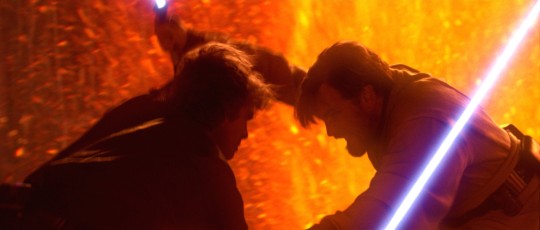
“This entire sequence is the film version of compensating for lack of a story and ability to connect with the audience on an emotional level … There are two types of people in this world; people that understand what I’m saying, and people that like the Star Wars prequels.”
Wow. What an arrogant jackass.
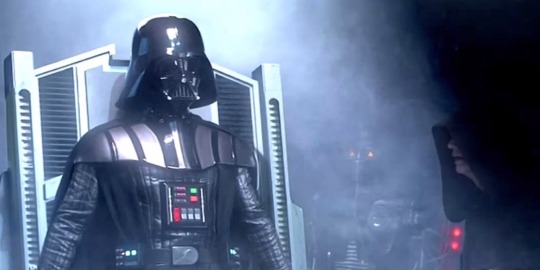
Plinkett complains about Vader’s “overblown importance” in the Prequels, that in the OT...
“He was not Space Jesus”.
Of course, the one and only thing that’s referred to as turning Vader into a Christ-figure is the “virgin birth”. (Slightly off the subject, but – who ever said Shmi was a virgin? Maybe she just did the math, and realized she couldn’t have been pregnant for 18 months…) Personally, I think it works well for the story, and makes sense in that Star Wars has always been a synthesis of mythological archetypes. And, of course, the symbol of the virgin birth is not exclusive to, nor did it originate with, the story of Christ:
“The virgin birth comes into Christianity by way of the Greek tradition. When you read the four gospels, for example, the only one in which the virgin birth appears is the Gospel According to Luke, and Luke was a Greek.” - Joseph Campbell, The Power of Myth
“[Darth Vader] was way overemphasized in these films … for no reason other than he’s Darth Vader, and that he’s famous to us … Lucas allowed the outside world to seep into the storyline, when it really shouldn’t have … But, if you look back at it from a story perspective, in A New Hope, he was just a weirdo in a suit – he was a part of a bigger story … he just seemed like one of the bad guys that carried out the business of the Empire … Vader was just some kind of asshole in a robot suit…”
Blah, blah, blah, blah, blah, blah, blah…
Stoklasa is looking at this “problem” from exactly the wrong angle. Whatever Vader seemed to be in A New Hope is irrelevant. What matters is what Vader became by the end of Return of the Jedi. And with all of Stoklasa’s referencing “Screenwriting 101” in relation to the Prequels, you’d think he might have done so here. That is, the beginning and ending of a story are connected in that they are the opposite ends of the story’s “spine” – the one thing that the story is all about. Beginnings foreshadow endings. And so, in the case of the Star Wars saga, the beginning is determined by the ending. Because, in a story’s end, in its climactic action, the ultimate meaning of the story is expressed…
The climax of the Star Wars saga is Darth Vader’s redemption. Vader and Luke resolve their internal conflicts, one right after the other (Luke rejects the dark side and Vader turns back to the light), Vader kills the Emperor, at the cost of his own life, effectively destroying the Sith… The Prequels were the set-up for this payoff. That is, the Prequel Trilogy was primarily about Anakin Skywalker’s fall to the dark side, not because “Lucas allowed the outside world to seep into the storyline”, but because that’s what the story needed to be about – what it was already about.
It’s called “basic story structure”.
How’s that for “Screenwriting 101”, asshole?
“How Vader became Vader is not as interesting as his redemption. How he became Vader really didn’t matter.”
Well … that’s an opinion. So, what exactly makes this fucktard, who simply didn’t care about (or understand) the story being told, suited to judge the value of that story…?
Of course, there are a godzillian more criticisms I could refute, but I think I’ve pretty effectively demonstrated that Plinkett’s reviews are pure bullshit. How about you? What do you think of Plinkett’s reviews, now? Let’s be masochistic and check the comments section:
“It’s by far the greatest film essay ever made. And hilarious too.”
“One of the best ‘documentary’ movies ever made and should have won awards.”
“The amazing thing about it is that it’s so astute. Like when he asks his friends to describe any character from The Phantom Menace without describing their physical appearance or costume, and they can’t.”
Oh, that.
Impressed by that, were you? Okay, here we go…
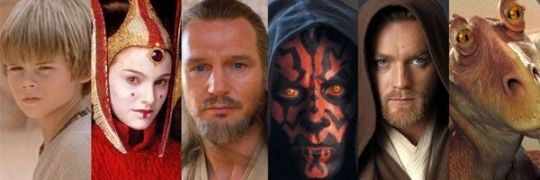
“The biggest and most glaring problem with The Phantom Menace is the characters. This is, like, the most obvious part of moviemaking, but I guess I gotta explain it when talking about this turd. Let’s start at Moviemaking 101, shall we?”
Plinkett helpfully, or condescendingly, explains to us what a protagonist is:
“The protagonist is someone that’s down on their luck, in a bad place in their lives, or someone where everything just doesn’t always go perfectly for them. Eventually, they’ll be confronted with some kind of obstacle or struggle that they’ve got to deal with … eventually, our [protagonist] will find themselves in the lowest point, where it seems like all is lost. But, eventually they’ll pull through, and conquer whatever force opposes them. It’s satisfying when our hero gets ahead from where they started off at. They make, like, a change. This is called an arc.”
Plinkett simply ignores the fact that his description of a protagonist fits multiple Prequel characters like a glove, and then, poses a question: Who’s the main character? One by one, he rules them all out for brief, reductive, glossed over, stupid reasons, and concludes:
“There isn’t one.”
This is Plinkett’s first major criticism of the characters in The Phantom Menace: there isn’t a protagonist among them, and there isn’t a “main character”.
But, what Plinkett offered as a definition of “protagonist” is rather a description of how a protagonist would typically be presented in a movie. That is, a protagonist may or may not be down on his luck, may or may not be sympathetic, and may or may not “pull through, and conquer whatever force opposes them.” A protagonist may experience internal conflict, leading to character growth, creating an arc – but not necessarily. All that’s really required to be a protagonist is that the character has an outer motivation; a desire, or a goal. And a story may contain multiple protagonists. “It is known”. ( …that was a Game of Thrones reference… )
Technically, the “main character” is the character whose outer motivation is the spine of the story. (i.e. The main conflict centers around this character’s goal.) In The Phantom Menace, that character is Queen Amidala. As Lucas stated, in the Episode I commentary, it’s the Queen’s story, told from the point of view of the Jedi.
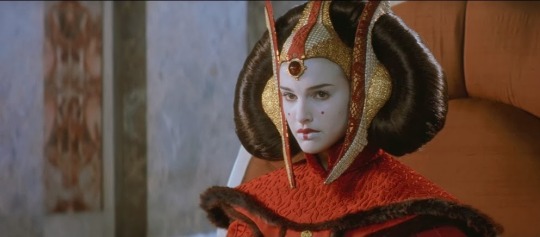
By the way, this is the reason Plinkett gives that Queen Amidala can’t be the main character of Episode I:
“‘Cause she was some foreign queen”.
Seriously. That’s it. And you don’t have to take my word for it…
Of course, Plinkett’s intention here is to give the impression that Lucas is such a dolt, such a complete hack, that he oops, forgot to include a protagonist. But, it’s absurd. You can’t have a story without a protagonist. It doesn’t make any sense.
Plinkett’s second, or other, major criticism is that the characters are weak. To demonstrate his point, he asks four or five people (friends?), to describe a couple characters from the Original Trilogy, and a couple from The Phantom Menace, without referencing their appearance or their vocation/“role”. When asked to describe Han Solo, Plinkett’s little panel of experts comes up with “roguish” and “dashing” and “charming”, etc. C-3PO: “prissy” and “bumbling” and “comic-relief”. But, when they’re asked to describe the characters from The Phantom Menace, we briefly see them each struggle and stammer… Qui-Gon Jinn: a couple of people mention that he has a beard… Queen Amidala: one man immediately throws in the towel, and claims that describing her is “impossible” because “she doesn’t have a character”.
Do you see the little flaw with Plinkett’s method?
“The more descriptive they could get, the stronger the character.”
This is a fallacy: Argument from silence (argumentum ex silentio) – the conclusion is based on the absence of evidence, rather than the existence of evidence. It’s the these-characters-are-weak-because-my-friends-are-inarticulate “argument”. That is, if I ask you to describe a person or a thing, and you are unable to do so, it could mean that the person or thing is non-descript. But, it could also simply mean that you are dumb. So, which is it…?
It’s been pointed out many times, by many people, that the characters of the Original Trilogy are not complex and nuanced so much as they are types, or, put another way (with a slightly negative slant), clichéd. Consider Plinkett’s own description of the OT characters:
“…the classic hero on a journey, the adventurous rogue, a damsel in distress, the wise old sage…”
Does it get any more cliché than that?
Clichés, of course, by virtue of being clichés, come quite readily to mind. You don’t really have to think too hard about them. That is, describing characters that are archetypal is possibly the easiest thing in the world to do…
And are “strong” characters, and characters that can be easily and neatly summed up in a few words, really the same thing…?
In addition, the principal characters of the Original Trilogy are quite in-your-face (and in each other’s faces), whereas those of The Phantom Menace (the Queen and the Jedi) are relatively disciplined and restrained, which makes sense given their circumstances and vocations. And this restraint is accentuated by those characters’ juxtaposition with the most over the top, in-your-face, silly character to ever appear in Star Wars.

In Luke Skywalker, Han Solo, and Princess Leia you had a farmboy, a space pirate, and a leader of a small band of rebel fighters (Yes, she was a princess, and “a member of the Imperial senate”, but she was pretty far removed from her status as royalty, and her position of influence within the galactic government, even before her planet was destroyed, and the Emperor dissolved the senate). In the grand scheme, they started out as three nobodies who were in desperate danger up to their necks. So, they held nothing back. They argued, they shouted, they bickered, they called each other names…
Can you imagine the Episode I characters, the Queen and the Jedi, acting like that? The audience would’ve criticized the film on that basis. They would’ve wondered, why don’t they act more disciplined and restrained … like they did … in the film…?
It may be that Stoklasa and friends just don’t pick up on subtlety and nuance. Remember, we’re talking about a guy whose idea of a subtle and nuanced character is a serial killer who constantly slurs his speech, only ever eats pizza rolls, and fucks his cat.
If you think about it, how difficult is it really to come up with a character description, to rival “roguish, dashing, and charming”, for Queen Amidala? A character who was elected ruler of her people at fourteen-years-old ... who is so compassionate, and has such integrity, that she is opposed to putting even one anonymous boy, on some backwater planet, in harm’s way, when it would be expedient ... who, strictly speaking, is not a pacifist, but clearly committed to non-violence (until all other alternatives are exhausted) ... and who then bravely leads the charge to take back her world... It’s not all that subtle, is it?
The point is that Stoklasa doesn’t explain why the characters are weak, he just shows footage of his friends saying nothing about them … until he gets to the review of the plot:

Plinkett expresses a particular hatred for Qui-Gon Jinn. His reasons…? He says that Qui-Gon’s character is “totally baffling … and I do not know why he’s in this movie”, and refers to Qui-Gon as “a drunk”, and “Qui-Gon Booze”. He says, “We constantly have to question every single action that’s taken by Qui-Gon”, and adds, sardonically, “the wise Jedi.”
He impugns Qui-Gon’s judgment in stowing aboard the ships to reach Naboo, and in running the Trade Federation blockade:
“Qui-Gon Jinn could’ve very easily gotten everyone killed!”
He claims that Qui-Gon has “very questionable moral values”, pointing out that he’s dishonest, and…
“…repeatedly uses his Jedi mind trick to his advantage, whether it’s … to use worthless money to scam Watto out of his ship parts, or to fix a legitimate bet to his advantage. It’s generally wrong to do these things, wouldn’t you say?”
Well, gee, gosh, golly, Plinkett, you’re right – it is wrong to do those things… Are you familiar with the term “dilemma”? Morality aside – you’re clearly an expert on screenwriting (knowing what a protagonist is, and all), so you know that when a character faces a dilemma, he or she makes a choice between two irreconcilable goods, or the lesser of two evils. And that this implies the rightness or wrongness of an action depends on context. Yes, Qui-Gon did fix a legitimate bet – in order to cheat a slave master out of owning a human being. To you, this is “wrong”? But, it’s Qui-Gon Jinn’s moral values that are “very questionable”…? In fact, Qui-Gon never uses the Jedi mind trick to his own advantage. He uses it to help save people’s lives, and free them from slavery and oppression.
Plinkett asks, if the ends justify the means, why didn’t Qui-Gon just steal the part from Watto? He suggests Qui-Gon could have taken the hyperdrive by force – by choking Watto, “while Pad-a-me grabs the part, and they run out of the shop”. If we ignore the fact that “the part” was not something Padme could’ve grabbed and run out of the shop with (as it looked like it probably weighed about a thousand pounds), while it may have been a solution to Qui-Gon’s problem, how would this have played to an audience? Seriously, a Jedi hero physically attacking a character who had not attacked him? How would this have played to children…? Scratch that. How would this have played to Plinkett? You don’t think he would have criticized it as being ridiculously out-of-character for a Jedi?
“This also leads me to believe that Qui-Gon Jinn is incredibly stupid.”
In addition to the seeming implication that Qui-Gon is gullible (“Watto tells him he’s the only guy in town who’s got the part … Watto is using an older-than-dirt sales tactic…”), Plinkett asserts that there were a number of obvious simple solutions to Qui-Gon’s problem (simpler than the one he chose); Qui-Gon could’ve sneaked into Watto’s shop, in the middle of the night, and stolen the hyperdrive … “Trade the Naboo cruiser for a less fancy, but functional ship” … hire a transport … go to another junk dealer, and use the mind trick to swap the republic credits for money that Watto would take…
The practical difficulties, security risks, and potential negative consequences of these alternative solutions aside, consider what actually happens in the film: The first thing Qui-Gon does after he leaves Watto’s shop is check with Obi-Wan to see if there’s anything aboard the ship with which to barter (seems perfectly reasonable). Then, he and his group start walking to we-don’t-know-where, to attempt we-don’t-know-what… We don’t know because the sandstorm hits, and they have to take shelter. And before the storm is over, Qui-Gon has discovered that Anakin is strong with the Force… That is, these alternative solutions are out of context. They’re moot points. We don’t know that these and/or other options were not, or would not have been, considered or attempted by Qui-Gon. Not every thought that goes through a person’s head immediately and automatically flies out their mouth … unless they’re Plinkett, I guess.
And Plinkett has criticized many scenes and sequences of the Prequels as being “boring”, and “stupid and pointless”, and as irrelevant “to the ultimate conclusion of the story”. So, you’d think that the last thing he would want is the films to contain more such scenes…
Suppose Episode I had included scenes of Qui-Gon going from junk dealer to junk dealer to confirm that Watto was indeed the only guy in town who had the part he needed. And scenes of; him attempting to swap his republic credits for “something more real”, and to hire a transport, and to trade the Naboo ship for a functional one, and/or explanations as to why these were not viable, or desirable, options. All in order to clearly demonstrate to the audience that Qui-Gon Jinn was not “incredibly stupid”. The inclusion of these scenes certainly would have made the movie longer, but would they have made it better? Would the movie have made more sense? What do you think Plinkett would have thought of these scenes…? Yeah. Exactly.
“Instead of using, like, the most common sense approach to everything, Qui-Gon concocts some kind of convoluted scheme…”
Plinkett then spends nearly two minutes pretending to be confused by the betting. I’m not going to jump through this particular hoop. The betting is not at all difficult to understand, and if you don’t get it from watching the movie, an explanation from me isn’t going to do you any good.
At one point, Plinkett seems to be speaking directly, and scornfully, to Qui-Gon himself:
“You say you took R2-D2 because he has the specs on the type of part you need, but yet Watto seems to know what you’re talking about, and you have a thingy that shows it.”
Actually, the “thingy” shows an image of the ship, not the part. And although Plinkett repeatedly implies that he finds it implausible when Qui-Gon is seemingly guided by the Force, he now, paradoxically, thinks it’s absurd that Qui-Gon didn’t have a premonition about Watto’s ship-parts knowledge…
Have you ever seen anyone work this hard to invent reasons to hate a fictional character? Have you ever heard anyone, other than Plinkett, say that they didn’t like Episode I, because Qui-Gon Jinn was stupid, and had questionable moral values? No, I didn’t think so. So, what’s the real reason that Plinkett hates Qui-Gon Jinn…?
“The older, wiser Jedi is the opposite of what he should be.”
I think that pretty much sums it up. Qui-Gon doesn’t conform to the expected cliché. And we know how Plinkett loves his clichés.
And after all Plinkett’s yammering about Qui-Gon, we run into this glaring contradiction:
“The more descriptive they could get, the stronger the character.”
“An incredibly stupid drunk, with poor judgment, and very questionable moral values.”
I’d say that’s at least as descriptive as “roguish, dashing, and charming”, wouldn’t you? I mean, I’m not saying that I agree with the description, but for a character he initially claimed was non-descript, Plinkett sure found a hell of a lot to say about him.
But, the most telling moment isn’t even in Plinkett’s Phantom Menace review. It’s in the Phantom Menace Review Interview Outtakes: Stoklasa asks one of his friends, “Can you explain the difference between Obi-Wan Kenobi and Qui-Gon Jinn … in Phantom Menace?” After a pause of about three seconds, “No.” And they laugh. Fade out.
Taking into account that Qui-Gon and Obi-Wan are both “good guys”, and both Jedi, the distinction between the two couldn’t have been more sharply drawn. Their characters are contrasted throughout the entire film; Qui-Gon is serious, Obi-Wan is flippant. Qui-Gon is warm, Obi-Wan is aloof. Qui-Gon is serene, Obi-Wan is anxious. Qui-Gon is unconventional, Obi-Wan is by-the-book. Obi-Wan is reverent of authority and tradition. Qui-Gon is a maverick who trusts his own instincts and judgment above all. Obi-Wan is the skeptic. Qui-Gon is the true believer. Obi-Wan is clearly frustrated with his Master’s seemingly reckless and rebellious nature. Qui-Gon grows impatient with having his judgment questioned by his Apprentice. As much as it’s possible for two good Jedi to be opposites, these two are opposites. Even when it comes to the lightsaber duel, when they’re separated by the ray shield doors...
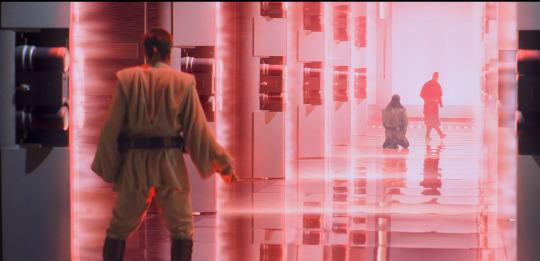
Obi-Wan is on his feet, ready for the fight...

...and Qui-Gon has entered a meditative state – and looks as though he may have fallen asleep.
And Stoklasa and his toadies didn’t notice any of this…?
Stoklasa asks his friend if he can tell the difference between the two characters, and all the genius can say is “no”. And then, they laugh. That’s the point. It’s a small group of friends who didn’t like The Phantom Menace, haven’t wasted a single thought on it, and find it funny that Stoklasa’s tearing it down. There’s nothing more to it than that. And Stoklasa’s little demonstration “proves” exactly nothing.
Concluded in Part 3…
#star wars#Prequel Trilogy#sw#PT#Episode I#episode ii#episode III#the phantom menace#attack of the clones#Revenge of the Sith#George Lucas#Mr. Plinkett#Mike Stoklasa#tpm#aotc#ROTS
0 notes